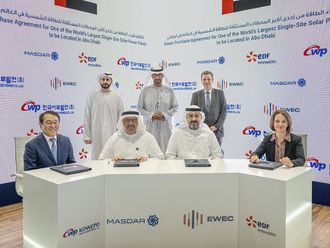Abu Dhabi: Mubadala Petroleum are looking at deploying capital in projects which are resilient to lower oil prices, according to the company’s outgoing Chief Executive Officer Maurizio La Noce.
“We are looking at projects which could be resilient if the prices go down to $70 (Dh257) or even $60. Manora (oil field) in Thailand is a great example. This is a great project even at lower prices. It is phenomenally efficient,” La Noce told Gulf News on the sidelines of last week’s Abu Dhabi International Petroleum and Exhibition.
Global oil prices have been plunging in the last few months creating jitters in the market. From a peak of $115 (Dh422) a barrel in June, oil price fell to less than $82 on Thursday.
Analysts have cited various reasons for the price slide including weak demand, over supply and boom in the production of shale gas in the US.
La Noce said prices are falling due to various reasons.
“There are so many factors that contribute to the direction of oil prices. There are economic reasons as well as political reasons. One of the simplest things to explain is exchange rates. When the dollar goes strong, oil prices go down as oil prices are pegged to the dollar,” he told Gulf News.
He said there could be other reasons like the disappointing performance of economies in South East Asia, China and India.
“On the other side, United States economy is booming and at the same time Europe is little bit in a depressing mode.”
There could be political reasons too like what is happening in Syria, Libya, Palestine-Israel conflict, Iran nuclear talks and Russia-Ukraine conflict. Iran, which is battling sanctions over the nuclear issue with Western countries is to reach an agreement before November 24 but the recent talks in Oman have not yielded any results.
Unconventional production
La Noce said it is unclear how negative or positive these current developments have impacted the oil prices. “There is supply and demand. Demand is not rising and supply is strongly driven by the unconventional production in the United States. In this scenario, what Opec (Organisation of the Petroleum Exporting Countries) is going to do will be important?”
Opec countries are due to meet in Vienna at the end of the month to make a decision whether to cut oil production or not. Kuwait and Saudi Arabia have said they will not reduce their output to increase the price.
“In the past Opec used to cut and oil prices went up. Now if they cut, they will lose the market share.”
According to La Noce, an oil correction is good for the industry as companies become more efficient and take up projects that can withstand the price plunge.
The oil and gas firm announced this week that the production has begun at Manora oil field in the Northern Gulf of Thailand. Production is expected to reach a peak rate of approximately 15,000 barrels per day when the production wells get completed. The company owns two more oil fields in Thailand.
The company also has the Ruby field in Indonesia, a $350 million net investment. In Manora, the company has 60 per cent share, about $200 million, Nong Yao oil is a $200 million development project of which the company has 70 per cent share. The company has made half a billion dollar capital in the development in the last two years.
Partnerships
Mubadala Petroleum said that Malaysia is going to be biggest investment in South East Asia. The company is working closely with Shell and Petronas on the gas project. The company said that Mexico is too on their radar but plans are in the early stage.
On partnerships, the outgoing CEO said the company is talking to everybody.
“We are in discussion with dozen or more companies. We partnered with Shell in Malaysia, we partnered with Total in Indonesia, we have discussions with BP and Oxy [Occidental petroleum] is our traditional partner.”
La Noce, a 12-year veteran of Mubadala, will pave way for Mussabeh Al Kaabi, who has been appointed as a chief executive officer last month.
The company manages assets and operations spanning 12 countries with a primary geographic focus on the Middle East, Africa, Central and Southeast Asia. Working interest production in 2013 was approximately 387,000 barrels of oil equivalent per day.












